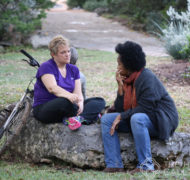Gentle Suggestions for Doubting Christians
Blog / Produced by The High Calling
I’m a natural-born skeptic. I find it hard to believe in things unless I can be convinced of their reality with proof or at least very clear evidence. C.S. Lewis pegged me with his observation that some people will commit to nothing rather than end up being wrong about anything. If professor Lewis hadn’t died the year I was born, I might think he had been reading my diary.
I was brought up in the Church and was happy to be counted among the faithful, but inevitable doubts surfaced about the time I got into high school. I kept my skeptical thoughts to myself, initially. My father was a pastor, and my whole life was enmeshed with our church. It seemed easier at the time to just ignore my doubts and hope they would go away.
By the time I got out of college, though, I had become very proud of my skepticism. I even came to the conclusion that all deep thinkers and authentic persons would eventually have such thoughts. And of course I arrogantly considered myself to be one of those deep-thinking, authentic people. Perhaps as a defense mechanism, my friends and I made fun of those who possessed what we considered to be simple faith: television preachers, Sunday school teachers, and the like. I’m sorry to say I lived in this prideful way for quite a few years.
Eventually I admitted to Jesus that I was not a very happy person, spiritually-speaking. There was a painful breaking of my spirit and a series of exorcisms that followed. It’s a bit of an ongoing process, I'm afraid. Jesus keeps casting demons out, and I keep inviting them back in. About all I can claim now is a little wisdom, a lot of humor, and a touch of grace.
Over the years I have discovered there are quite a few skeptics in this world who, nonetheless, have a deep desire to remain connected to Christianity, as I always have. I’m afraid the Church as a whole has not known what to do with her doubting children. Often as not, she has simply told them to have more faith. And by faith she meant belief. Some left her immediately. Others tried hard to believe, failed miserably, and then wandered away, looking back over their shoulders with a sorrow they didn’t fully understand. There is no official doubter’s catechism that I’m aware of, so I’ll offer some thoughts of my own that might do until its publication. The following list is part of my slowly evolving, personal rule of life and faith. Consider these to be gentle suggestions for doubting Christians.
1. Let faith and belief have different meanings.
Belief is what’s going on in your head. Faith is more about what you do with your body. Belief is doctrinal, while faith is more about worship, prayer, and service to Christ. If you are a person with a lot of doubts, let the practice of your faith be kept separate from the doctrines of your faith.
2. Let your doctrine follow your practice.
One of the great failings of the Western Church has been asking for intellectual acceptance of doctrinal propositions before a person can begin practicing the faith. I think the phrase “practicing the faith” ought to be taken more literally. Some of us need a lot of practice.
3. When doubts plague you, lean into your practice.
In seasons when I don’t believe in God at all, I can scarcely afford to miss a Sunday at church. Never is our devotion to God more important than when our doubts are the most severe. And of the various spiritual practices, the most humble and service-oriented ones are the best for helping us cope with doubt.
4. Do not burden your devotion with the goal of erasing your doubts.
Worship and prayer and service are good things. Do not pollute them with the goal of vanquishing your doubts. Your doubts may recede or they may not. Your worship and devotion will be purer if offered in love and not with an ulterior motive.
5. Do not be proud of your doubts.
It may be true that smart people tend to have more doubts. And maybe you are even one of those smart people. So what? If you are intelligent, you deserve no more credit for that than for your hair color. In a cosmic sense, none of us are much smarter than a bag of hammers anyway. Be ever mindful of the dangers of intellectual pride.
6. Tell the truth about your doubts, but take care not to disturb the peace of others.
Do not look down on those for whom belief comes easily. Count them as a joy to the Kingdom of Heaven. Count their faith as childlike and beautiful. Do not attempt to arouse doubts in others as a way to help you cope with your own. That will only lead to greater sorrow.
Every child of God follows his or her own path. Doubting children have long, winding paths that lead them into strange and wondrous places. Follow your path. Do not be in a hurry. Humbly think of others as greater than yourself. Tend whatever gardens are given to you. Mind the children and other pilgrims you meet on the way. And finally this: if you are hungry for faith and reading this with hope, you’re going to be okay.





